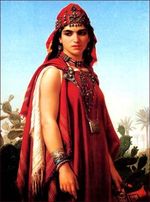Template:Pictorial-Islam-options: Difference between revisions
| [checked revision] | [checked revision] |
mNo edit summary |
mNo edit summary |
||
| Line 1: | Line 1: | ||
<noinclude>Also see: [[Template:Pictorial-Islam]]</noinclude><!-- HELP NOTES: Each option tag handles one random story --><choose> | <noinclude>Also see: [[Template:Pictorial-Islam]]</noinclude><!-- HELP NOTES: Each option tag handles one random story --><choose> | ||
<option weight="1">{{Pictorial-Islam|1=Qur'an Describes Gender Determination By Sperm|2=[[File:Atum-large.jpg|180px|link=Quran Describes Gender Determination By Sperm]]|3=Various individuals have claimed the Qur'an is the only ancient book that states gender is determined by the sperm. In this, they may point out the ignorance of the Greeks who thought gender was determined by the relative strengths of sperm from the male and female parents as Hippocrates imagined. | |||
This article does not seek to prove that the ancient Egyptians shared some aspects of the scientific understanding of gender determination and reproduction. It merely aims to show that the Qur'an was not the first religious text to suggest that gender is determined by the semen of the male parent. | |||
In viewing the evidence, it is apparent that some of the ancient Egyptians believed that gender is created by the sperm from the male parent, and reproduction is via male and female union. This belief predated the Qur'an by about 2,900 years as evidenced by the pyramid text of Pharaoh Pepi I, 2332-2283 BC. ([[Quran Describes Gender Determination By Sperm|''read more'']])}}</option> | |||
Revision as of 19:40, 10 February 2014
Also see: Template:Pictorial-Islam
|
